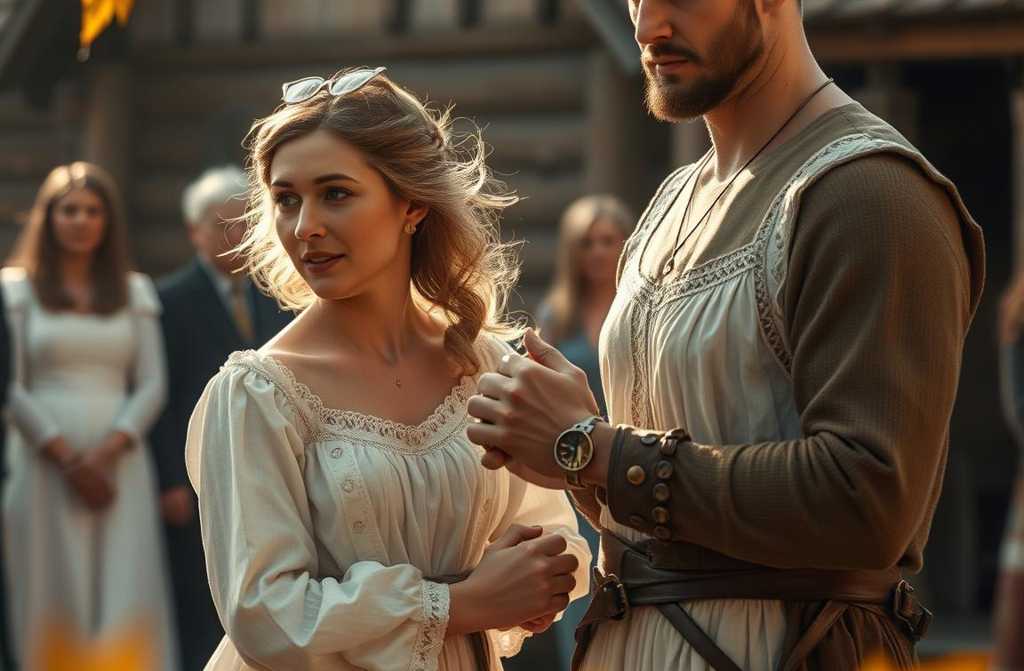**Diary Entry**
It was the day of Lydia the postwomans wedding. Oh, what a wedding it wasnot a celebration, but a bitter sorrow. The whole village gathered outside the parish hall not to rejoice but to judge. There stood our Lydia, slender as a reed, in a simple white dress shed sewn herself, her face pale, her eyes wide with fear but stubborn. And beside herher groom, Stephen. Stephen was known behind his back as “the Convict.” Hed returned a year before from a place not spoken of in polite company.
No one knew for certain what hed been inside for, but the rumours were worse with each telling. Tall, brooding, a man of few words with a scar running the length of his cheek. The men greeted him through gritted teeth, mothers hid their children from him, and dogs tucked their tails at the sight of him. He lived on the outskirts in his grandfathers crumbling cottage, working the hardest jobs no one else would touch.
And it was this man our quiet Lydiaan orphan raised by her auntchose to marry.
When the registrar pronounced them husband and wife and uttered her officious, “You may congratulate the newlyweds,” not a soul in the crowd moved. The silence was so thick you could hear a crow caw from the poplar tree. Then, through that silence, stepped Lydias cousin, Peter. After her parents death, hed treated her like a little sister. He walked up, fixed her with an icy stare, and hissed loud enough for all to hear:
“Youre no sister of mine anymore. From today, I have no sister. Youve tangled yourself with God knows who, shamed your own blood. Dont you dare set foot in my house again.”
He spat at Stephens feet, then turned and shouldered through the crowd like an icebreaker. And after him, tight-lipped, went Lydias aunt.
Lydia stood unmoving. A single tear traced down her cheek, but she didnt wipe it away. Stephens jaw clenched under his stubble, his hands curled into fistsI thought he might lunge. But instead, he looked at Lydia, took her hand as if afraid she might break, and said softly, “Lets go home, Lydia.”
And they left. Just the two of them, against the whole villagehe, tall and grim; she, delicate in her little white dress. Whispered venom and scornful stares followed them. My heart ached so fiercely I could barely breathe. Watching them, I thought, *Lord, how much strength will it take for them to stand against the world?*
And it had all begun so small. Lydia delivered the posta quiet, unremarkable girl, lost in her own world. Then one autumn, in the thick of the mud season, a pack of strays cornered her at the edge of the village. She screamed, dropped the heavy postbag, letters scattering in the muck. Then, out of nowhere, Stephen appeared. He didnt shout or wave a stick. He just stepped up to the lead dog, a great shaggy brute, and said somethinglow, gruff. And would you believe it? The brute tucked its tail and backed off, the whole pack slinking after.
Stephen wordlessly gathered the sodden letters, wiped them as best he could, and handed them back. Lydia looked up at him with tear-filled eyes and whispered, “Thank you.” He only grunted, turned, and walked away.
After that, she saw him differentlynot with fear, but curiosity. She noticed what others refused to: how he fixed old Mrs. Whitlows sagging fence without being asked, how he pulled a neighbours calf from the river, how he tucked a freezing kitten inside his coat. He did it all furtively, as if ashamed of his own kindness. And Lydia saw. Her quiet, lonely heart reached for his, just as bruised and alone.
They began meeting at dusk by the far well. He mostly listened; she chattered about her small news. His harsh face softened. Once, he brought her a wild orchidplucked from the marshes where none dared go. That was the moment she knew she was lost.
When she told her family shed marry Stephen, the uproar was deafening. Her aunt wept; Peter swore to maim him. But Lydia held firm. “Hes good,” she kept saying. “You just dont know him.”
And so they lived. Hard, scraping by. No one would hire him steady; she earned pennies at the post office. But their ramshackle cottage was always clean, somehow warm and welcoming. He built her bookshelves, fixed the porch, planted flowers beneath the window. Evenings, when he came home black with work, shed set a plate of hot soup before him without a word. And in that silence was more love than any grand speech could hold.
The village never accepted them. The shopkeeper shorted Lydias bread; children hurled stones at their windows. Peter crossed the street if he saw them.
Then came the fire.
A dark, windy night. Peters barn caught first, the flames leaping to the house. The village turned out with buckets, but the fire roared, a pillar of flame clawing the sky. Then Peters wife screamedtheir little girl, Mary, was still inside.
Peter lunged for the door, but the flames drove him back. The men held him”Youll burn, you fool!”while he howled in terror.
Then Stephen barrelled through the crowd. Hed come late, his face unreadable. He took one look at the house, at Peters agony, then doused himself with water from a barrel and walked into the inferno.
The crowd held its breath. Beams cracked, the roof collapsed. No one believed hed return.
Thensmoke parted. Stephen staggered out, his clothes smouldering, his hair singed. In his arms, wrapped in a wet blanket, was the girl. He passed her to the women and collapsed.
Mary was alive, just smoke-choked. But Stephenhis hands, his backruined. As I tended him, he whispered one name: “Lydia Lydia”
When he woke in the clinic, the first thing he saw was Peter on his knees. Not jokingon his knees. Peter said nothing, just pressed Stephens hand to his forehead. That wordless bow said more than any apology.
After that, the dam broke. Slowly, then all at once, warmth flowed to Stephen and Lydia. His scars remained, but they were different nownot a convicts marks, but medals of courage.
The men rebuilt their cottage. Peter became closer than kin, always theremending the porch, bringing hay for their goat. His wife, Helen, brought Lydia cream and pies. They watched Stephen and Lydia with guilty tenderness, as if making up for old wounds.
A year later, their daughter was bornMary, the image of Lydia, fair and blue-eyed. Then a son, Johnny, Stephens double but for the scar.
That once-derelict house rang with laughter. The brooding Stephen was the gentlest of fathersswinging the children high, carving them wooden horses and birds. His rough hands made miracles.
I remember coming once to check Lydias blood pressure. The scene in the yard was a paintingStephen crouched, fixing Johnnys tiny bicycle, Peter holding the wheel. The boys played in the sandpit, building together. Peaceful silence, just the tap of a hammer and bees humming in Lydias flowers.
I looked at Peter, whod cursed his sister, standing shoulder-to-shoulder with the “convict.” No anger, no pastjust quiet work and children playing. As if the wall of fear had melted like spring snow.
Lydia stepped onto the porch with cold cider for them both. She smiled at me, soft and bright, her gaze drifting from husband and brother to the children. In that look was all the hard-won joy in the world. She hadnt been wrong. Shed fought for love against all odds, and won everything.
Now, I look down their lane. Theres their cottage, bright with geraniums. Stephen, grey but strong, teaches Johnny to split wood. Mary, nearly grown, helps Lydia hang washing that smells of sun and wind. They laugh over some secret, girlish thing. And I thinkthis is what it means to live.







